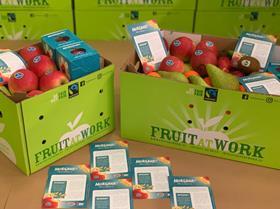
The Covid-19 pandemic has disrupted many areas of business for fresh produce companies, but a particular headache has been the difficulty of introducing new varieties to consumers while restrictions on tastings must remain in place. For Belgian cooperative BFV, which launched the new Morgana apple this Christmas, finding new ways to reach shoppers, including through box schemes, has been important.
“Morgana has been received well by local retailers in Belgium,” says commercial director Marc Evrard. “For the moment, volumes are limited, so we’re selling to the smaller retailers. We are also working with a company specialised in fruit boxes, Fruit At Work. Through this scheme, Morgana is able to reach 15,000 consumers a week. This is an alternative way to get people to taste this new variety.”
Concerning exports, BFV had a lot of plans in store to mark the ten-year anniversary of Truval Conference pears in China, but Covid-19 has demanded a rethink. “It’s been difficult to go the whole hog,” says Evrard. “Some promotions and activities you can still do. We developed special boxes and we are targeting various sales channels. Let’s see what happens. Either there will be more opportunities or more challenges.”
The local concern over a rise in cases in China, followed by a sudden lockdown, remains real. “A port can suddenly close due to Covid cases,” says Evrard, “and there is no time for us to react. This hampers the business, as importers can be hesitant to order more produce. They worry that if a bit city goes into lockdown, they will be stuck with stocks they can’t sell.”
As for the UK market, although the massive queues of trucks have not yet materialised, Brexit has made life no easier for European suppliers. “It’s not just an additional cost, but also extra work and extra hassle,” says Evrard. “You lose flexibility. Sending to India or China, at least you know every week that you have a vessel, and the container needs to be loaded on a particular day, planned well ahead along with phytosanitary checks. With the UK, it’s more like a day-to-day business. If you’ve got used to doing things in a flexible way over the decades, that’s no longer possible, and last-minute orders are difficult.”
With each import-export document costing €200, and suppliers requiring one for every single customer, costs can quickly add up. “Perhaps for bigger distributors this won’t change things much, but for smaller operators it makes it difficult to continue to work in a flexible way,” says Evrard. “Every grocery shop was able to order their imports without much hassle. Now, when it’s much more likely that there will be hiccups and delays, it’s not worth their while, nor the exporters’.”



